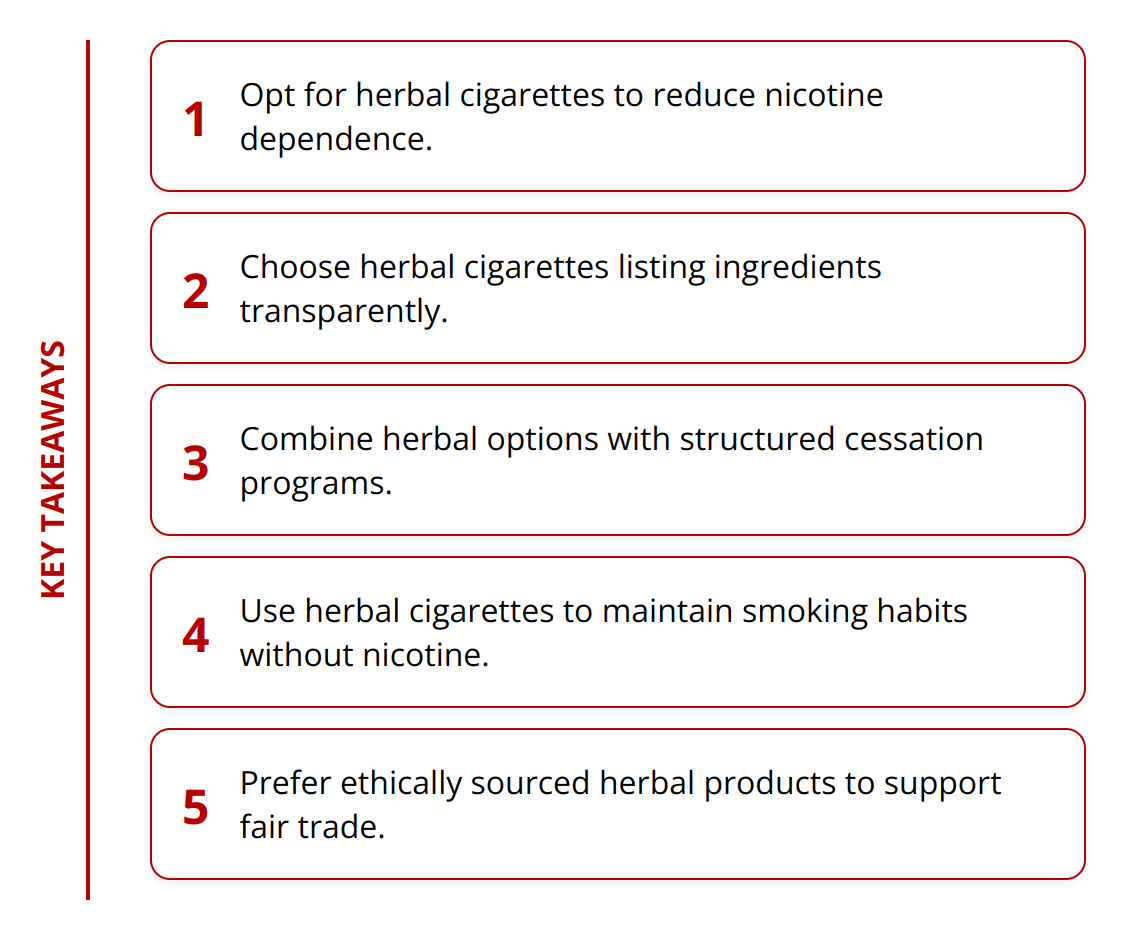
Herbal Smoking Wellness: All You Need to Know
Explore the benefits and tips of herbal smoking wellness with information on health impacts, botanical choices, and DIY blends.

Exploring the world of herbal cigarette benefits reveal a range of compelling benefits.
From health advantages to environmental and social perks, there’s much to consider.
We at KHOOR are dedicated to bringing you the essential guide to understanding these alternatives to traditional cigarettes.
Herbal cigarettes offer a unique alternative to traditional tobacco products. The implications are substantial, affecting everything from individual health to societal trends.
Components and Ingredients
Herbal cigarettes are composed of various natural ingredients like mullein, ginseng, and lavender. Unlike traditional cigarettes, which contain over 5,000 chemical compounds—many of which are harmful—herbal cigarettes focus on plant-based elements. Notable herbs commonly found in these cigarettes include:
Differences from Traditional Cigarettes
Herbal cigarettes stand apart from traditional tobacco cigarettes in key ways. For starters, they are tobacco-free and nicotine-free, meaning they lack the addictive qualities tied to nicotine. This absence can make it easier for individuals to quit smoking. However, it’s crucial to mention that burning herbs can still produce harmful chemicals like carbon monoxide.

Statistics indicate that over 8 million deaths annually are linked to tobacco use. Herbal cigarettes serve as a non-toxic alternative that doesn’t contribute to this alarming number. Additionally, the global tobacco market, valued at $849.9 billion in 2021, shows a significant potential for herbal cigarettes to disrupt the industry.
Common Myths and Misconceptions
One prevalent myth is that herbal cigarettes are completely harmless. While they do eliminate some risks associated with tobacco, they are not entirely risk-free due to the potential release of toxic substances when burned.
Another common misconception is that herbal cigarettes are a gateway to quitting smoking. While they can be a less harmful alternative, the habit of smoking can still lead to dependency. Concrete evidence on their effectiveness as cessation aids is limited.

Herbal cigarettes attract opinions because they often carry exotic, flavorful herbs that may appeal to younger smokers. This can pose an addiction risk if not approached cautiously.
Key Takeaways
For a more detailed comparison, explore the differences between herbal and traditional cigarettes.
When discussing the health benefits of herbal cigarettes, one of the most compelling arguments lies in reducing nicotine dependence. Nicotine, found in traditional tobacco products, is known for its addictive properties. By opting for herbal cigarettes, individuals remove the addictive component of nicotine, which can help ease the transition for those looking to quit smoking. Traditional nicotine replacement therapies can be effective, but herbal cigarettes offer another angle, minus the dependence.
Another significant advantage is the absence of many harmful chemicals present in traditional tobacco products. Tobacco smoke contains around 5,000 compounds, 44 of which are genotoxic and cytotoxic. In contrast, herbal cigarettes, although not entirely risk-free, do not contain tobacco-specific nitrosamines and nicotine, both of which are known carcinogens. This stark difference reduces exposure to a multitude of harmful chemicals, making herbal cigarettes a potentially safer option for those unwilling to quit smoking altogether.

Herbal cigarettes can be integrated into smoking cessation programs as complementary tools. Smokers attempting to quit often struggle with behavioral and psychological dependencies, not just physical addiction to nicotine. Herbal cigarettes can maintain the act of smoking without the addictive substances, helping to mitigate withdrawal symptoms. Programs that incorporate the use of herbal cigarettes, along with counseling and other support measures, might see higher success rates.
For practical purposes:
Combining these elements can make the transition towards a smoke-free life more manageable.
For more tips on handling cravings, check out managing cravings.
Herbal cigarettes can positively impact both the environment and society. Their unique composition and sourcing practices contribute to these benefits.
Lower Environmental Impact
Traditional tobacco farming is resource-intensive, requiring large amounts of water and pesticides. Growing tobacco also depletes soil nutrients and contributes to deforestation. In contrast, the herbs used in herbal cigarettes, such as mullein and lavender, generally have a lower environmental footprint. These herbs often require less water and fewer pesticides, resulting in reduced environmental impact.
Additionally, the manufacturing process for herbal cigarettes typically avoids harmful additives, further minimizing pollution. Reducing the environmental load from cigarette production can lead to a more sustainable future.

Ethical Sourcing of Ingredients
The herbs used in herbal cigarettes are often ethically sourced, focusing on fair trade and organic farming practices. This not only benefits the environment but also the communities involved in growing these herbs. Ethical sourcing ensures that farmers are paid fair wages and work under humane conditions.
Opting for herbal cigarettes from companies that prioritize these practices can contribute to global sustainability efforts.
Cultural Significance and Acceptance
Herbal cigarettes have a long history in various cultures, often used in rituals and for medicinal purposes. For example, ginseng has been a staple in traditional Chinese medicine for centuries. This cultural grounding can make herbal cigarettes more acceptable in social settings that frown upon tobacco use.
These products can also bridge generational gaps. Older generations might appreciate the traditional uses of herbs, while younger people might be attracted to the diverse flavors and lower health risks. This cultural significance can make herbal cigarettes a socially acceptable option, promoting wider acceptance and use.
For more on cultural significance, you can explore the journey from ban to legalization of hemp, which parallels the acceptance of herbal smoking alternatives.
Herbal cigarettes present an opportunity for environmental and social improvement. By focusing on sustainable practices and cultural integration, they offer a meaningful alternative to traditional tobacco products.
Herbal cigarettes offer a variety of benefits, presenting a safer option for those looking to move away from traditional tobacco products. These benefits extend beyond personal health to include environmental and social advantages. They are free from nicotine and tobacco, which significantly reduces addiction risks and harmful chemical exposure. This makes herbal cigarettes a healthier substitute while maintaining the smoking ritual.

Common concerns do arise, particularly regarding the misconception that herbal cigarettes are entirely harmless or extremely effective cessation aids. It’s important to be aware that, although less harmful, burning herbal ingredients can still produce some toxic substances. The fact remains that they lack the chemicals found in tobacco smoke, which means fewer health risks.
Making informed decisions about smoking alternatives is essential. Evaluating ingredients, considering the environmental impact, and understanding the potential risks can help you make the best choice for your health and lifestyle.
KHOOR provides a premium option with their natural, tobacco-free, and nicotine-free herbal cigarettes. Available in flavors like Original, Menthol, Vanilla, and Berry Blue, they offer a satisfying smoking experience. Consider trying KHOOR for a healthier, flavorful alternative. For comparison with traditional cigarettes, check out this comparison.
By making informed choices, you can enjoy the benefits of herbal cigarettes while minimizing health risks and supporting sustainable practices.

Explore the benefits and tips of herbal smoking wellness with information on health impacts, botanical choices, and DIY blends.

Explore how KHOOR supports nicotine replacement with herbal cigarettes, success rates, and user stories for a healthier, smoke-free life.

Explore the benefits of quitting tobacco & nicotine with healthy alternatives. Improve your health and well-being with tips and data-backed advice.

Achieve your quit smoking goals with KHOOR’s supportive approach. Discover benefits, statistics, and practical tips for a healthier life.

Explore practical tips to smoke without nicotine, including product recommendations and real-life statistics to support your healthier lifestyle choices.

Explore tobacco-free alternatives with KHOOR. Learn about options like herbal cigarettes, nicotine pouches, and vaping for a healthier lifestyle.